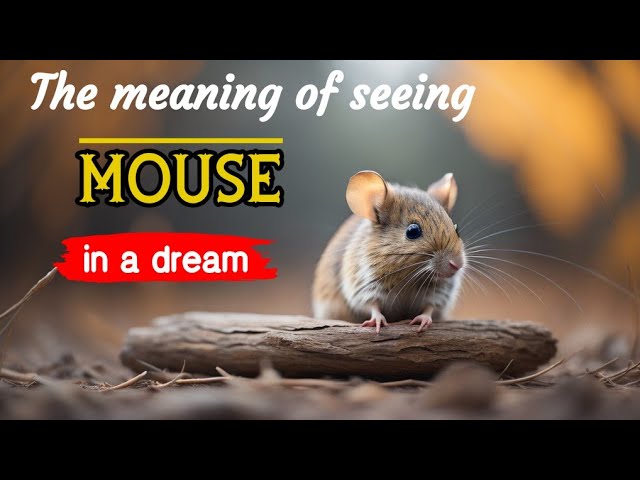Meaning of a mouse in a dream: interpretations and insights

- 1 Introduction to Dreams and Their Symbolism
- 2 The General Meaning of Mice in Dreams
- 3 Common Scenarios Involving Mice in Dreams
- 4 Cultural and Historical Perspectives on Mice Symbolism
- 5 Psychological Insights: The Mouse as a Symbol of Subconscious Thoughts
- 6 The Role of Context in Dream Interpretation
- 7 Reflecting on Mice Dreams for Personal Growth
Introduction to Dreams and Their Symbolism
Dreams have been a source of fascination for centuries, serving as windows into our subconscious mind. Within this mysterious realm of sleep, our thoughts, fears, and emotions often manifest as vivid images and scenarios. One common figure in dreams is the mouse—an animal that carries a wealth of symbolic meanings. Understanding what a mouse represents in a dream can lead to insightful revelations about oneself and one’s environment.
The General Meaning of Mice in Dreams
When we dream of mice, we may be experiencing reflections of our own anxieties, insecurities, or feelings of vulnerability. Dreaming of a mouse typically points to several underlying issues, including:
- Insecurity: Mice are often seen as small, timid creatures, which can symbolize feelings of inadequacy.
- Fear: An encounter with a mouse in a dream may indicate that you are being haunted by fears or concerns that are “nibbling away” at you.
- Attention to Detail: Perhaps it suggests that you need to pay more attention to the small things in life that matter.
By assessing the context in which the mouse appears, dreamers can interpret its meaning accurately.
Common Scenarios Involving Mice in Dreams
Each dream scenario featuring a mouse can yield different interpretations based on the actions and emotions involved. Here are some common dreams that involve mice, along with their meanings:
Seeing a Mouse
Spotting a mouse in your dream can indicate that something sneaky or unwelcome is occurring in your waking life. It may represent a situation or person that, while appearing harmless, could become a source of stress or anxiety. The presence of the mouse might encourage you to remain vigilant and address the lurking issues head-on.
Catching a Mouse
If you dream of catching a mouse, it might signify control over some aspect of your life that has previously left you feeling vulnerable. This scenario can suggest that you are learning to confront your fears, addressing issues that have been bothering you, or finally taking action on unresolved matters.
Killing a Mouse
Dreaming about killing a mouse may represent a strong desire to eliminate a source of stress or anxiety in your life. However, it can also highlight an aspect of yourself that you are trying to suppress. This type of dream can serve as a reminder to resolve conflicts before they grow unmanageable.
Cultural and Historical Perspectives on Mice Symbolism
Throughout history, different cultures have assigned various meanings to mice, viewing them in both positive and negative lights. Understanding these cultural differences can enrich our interpretation of dreams involving mice:
- In Western cultures: Mice are often seen as pests and symbolize fear, anxiety, and a feeling of being overwhelmed.
- In Eastern traditions: Conversely, mice can symbolize prosperity and the ability to adapt. In some cultures, they are revered as creatures that signify wealth and good fortune.
- In folklore: Mice have often been portrayed as wise, resourceful creatures, helping humans in times of need.
An awareness of these cultural interpretations can offer dreamers a broader understanding of their own experiences involving mice in their sleep.
Psychological Insights: The Mouse as a Symbol of Subconscious Thoughts
According to psychological theories, particularly those proposed by Sigmund Freud and Carl Jung, dreams are reflections of our subconscious desires and fears. In this context, a mouse may symbolize:
- Repressed Emotions: Mice could signify hidden feelings that you have yet to confront, such as anxiety or guilt.
- Self-Esteem Issues: The presence of mice in dreams may indicate a struggle with self-worth or a feeling of insignificance.
- Social Anxiety: For some, mice are symbolic of social discomfort, indicating fears of being judged or ostracized by others.
Understanding these psychological implications can provide deeper insight into why mice appear in dreams and how they relate to the dreamer’s emotional state.
The Role of Context in Dream Interpretation
The context in which mice are encountered in dreams plays a crucial role in determining their meanings. Consider the following factors:
Emotional State during the Dream
The emotional atmosphere of the dream can alter its interpretation significantly. Were you frightened, amused, or indifferent when encountering the mouse? Your emotional response can either amplify or diminish the message the dream is attempting to convey.
The Mouse’s Actions
What the mouse does in the dream can carry important implications. Is it simply scurrying around, conversing with you, or actively causing chaos? These actions can reveal different aspects of your life, decision-making processes, or relationships.
Personal Associations with Mice
Your individual history or feelings towards mice can also shape their meaning in your dreams. If you have a pet mouse or a history of fear from a past encounter, your personal associations will play a significant role in the interpretation.
Reflecting on Mice Dreams for Personal Growth
Finally, reflecting on dreams that involve mice can lead to invaluable insights and personal growth. Here are some steps to make the most of these dreams:
- Keep a Dream Journal: Record your dreams as soon as you wake up, noting all details including emotions and settings.
- Ask Questions: Reflect on what the mouse represents in your life. What current challenges could it symbolize?
- Engage in Self-Reflection: Use the insights gained from your dreams to inspire personal growth, resolve conflicts, and explore your emotional landscape.
By engaging thoughtfully with your dreams, especially those featuring mice, you can harness their potential as tools for self-awareness and transformation.






